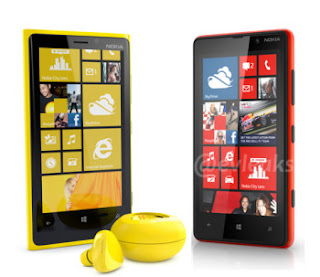Making Sense of the Next Nokia Windows Phone
My very first mobile phone was a Nokia. The Nokia 5220 XpressMusic. I guess many of you would agree when I say a Nokia phone was probably your first handset as well. I have switched a couple of other phones in between (none of them were from Nokia), but my present cellphone is again a Nokia. The Nokia Lumia 800 running on Windows Phone. With that, I come to the topic in question: What is Nokia planning to unveil tomorrow? Nokia had been until recently the biggest manufacturer of phones. Now that position has not only been usurped by Samsung, which is one of the most popular Android OEMs today, it would be safe to say that Nokia failed to nip Android in the bud when time was by its side. It could have revamped its Symbian operating system and come up with technically superior phones.
 |
| Lumia 920 and Lumia 820 |
Microsoft too has a similar story. It had its own Windows Mobile platform which was slowly declining ever after the release of Apple iPhone and yes, Android. But unlike Nokia, it decided it was time to rethink its approach towards the mobile operating system and came up with a freshly redesigned and renamed Windows Phone 7 (WP7) OS.
The radically different tile-based user interface called Metro won a lot of plaudits for its clean, consistent and simple look - characteristics that are normally attributed to Apple's iOS. While it was the Mango and Tango updates (both referred as WP7.5) that made the OS more feature complete, it is yet to emerge as a strong contender to Android and iOS. A lack of competing features and a compelling ecosystem (apps etc.) could be cited as multiple reasons.
However, the prospects are looking bright with Windows Phone 8. The upcoming mobile OS shares many common traits (like the kernel) with its desktop variant Windows 8 and hence it allows for easier development of apps. Aside this, there are other features like NFC, Mobile Wallet, Skype integration, better multitasking, parental controls, enterprise support among tons of other features. That's more or less a new OS we are talking about. And precisely for this reason, none of the current generation Windows Phone devices would be eligible for a WP8 upgrade.
The news is a dampener no doubt, but there is a WP7.8 upgrade in store that will bring in some features to the WP7.5 phones. While this comes at a risk of losing existing customers, Microsoft clearly understands the precarious position it is in. Failing to keep up with the market sentiment is simply disastrous especially when Android and iOS are surging ahead exponentially. Even Canadian manufacturer Research in Motion (RIM) is on its track to announce a newly revamped OS called BlackBerry 10 for its upcoming phones next year.
And therefore this partnership between the two companies makes perfect sense. It's a do-or-die scenario for both Nokia and Microsoft. For Nokia even more so, as it has ditched Symbian and the critically acclaimed Meego in favor of WP. But if WP8 fails to excite the market, it spells doom in big bold letters for the Finnish giant. Nevertheless, it does have a couple of advantages over its other WP competitors like Samsung, HTC and Huawei.
Nokia's design approach has been really good in N8, N9, Lumia 800/900 and in all probabilities we can expect the same from tomorrow's event. In addition, the company's exclusive apps for the Lumia devices have brought in genuine feature additions to the phone and have made them stand out from the rest. The latest entrant to this list is the augmented reality app City Lens, which is now available on the Nokia Windows Phone Marketplace. A success for Nokia would considerably shift consumer focus back to it and eventually help turn around its desperate situation. Though Microsoft doesn't hinge on Nokia the way the latter relies on it, a successful WP8 phone could mean luring in new hardware partners for its phone software. So do you think Nokia and Microsoft have a chance?
Several leaks so far have hinted at three possible devices - Lumia 920, Lumia 820 and a Lumia 610 successor; the first two running on WP8 and the third on WP7.8. The 4.5-inch Lumia 920 is supposedly the new flagship phone and will include 1GB RAM, 1.5GHZ dual-core processor, PureView camera and a 32GB storage space. The Lumia 820, on the other hand, is a mid-range smartphone with a 4.3-inch display and support for SD card slot. Both the devices are also rumored to have wireless charging feature that allows users to charge the phone on a special pad instead of the conventional means of plugging the phone to an electrical socket using a cable.
If the devices really promise the bang for their bucks, there is definitely an opportunity for Microsoft and its premier hardware partner Nokia to capitalize on the outcome and emerge as the third viable alternative to Android and iOS. Despite the fact that Samsung announced the world's first WP8 phone, tomorrow's Nokia-Microsoft event is considerably causing enough excitement as it comes exactly a week ahead of Apple's impending iPhone 5 announcement on September 12. Plus, Samsung’s recent loss against Apple is swaying manufacturers to consider other options, which means Microsoft’s Windows Phone could get a new lease of life. And most importantly because it’s the last chance both these companies are ever going to get. Whatever be the case, we will know in a day!

Comments
Post a Comment